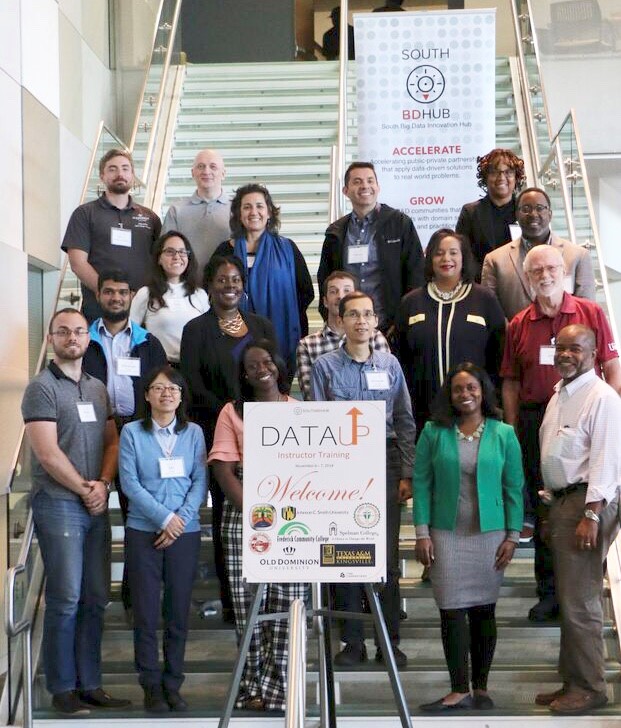
Society is increasingly becoming more data-driven and data-literate. It is vital every institution has the capabilities and infrastructure to engage and develop learners prepared to interact and succeed in such a society. Numerous studies have identified the expanding data divide between institution types and the need to develop successful bridge initiatives. The South Hub begin to address this need by creating a 3-part program, DataUp. Through this program, the South Hub is directly impacting each participating institution’s data science education capacities.
The first component of the program is a hosted 2-day data or software workshop presented by the Carpentries. This provided an opportunity for each participating institution to engage in a workshop that specifically addressed their data knowledge gaps (for more information on these workshops, Click Here). Exposing students to these intensive workshops, students are able to gain hands-on training and exposure to principles and tools, such as shell and JupyterHub. Removing the associated ‘fear factors’ empowers learners to employ and address challenges with data. The second component of the DataUp program is a 2-day pedagogy intensive instructor training.
On Nov 6 & 7, 2018, The DataUp program welcomed participating institutions for the instructional training. During this instructional training workshop, faculty teams engaged in a pedagogy intensive to learn best practices concepts for data science education. Many instructors noted the timeliness of this training for not only their students but for faculty overall professional development. One faculty member noted the ‘workshop is great to teach techniques [necessary] to teach concepts like these [at my home institution]. In [a] purely doctoral program, they don’t teach pedagogy’. The workshop did not include analytical software training but discussed mindset cultivation, participatory live coding benefits, managing diverse classrooms, and more. The workshop also included multiple participatory experiences for faculty teams to practice and commit to memory techniques and best practices needed to actively engage learners and complex concepts.
Here are a few points from the workshop:
- Most students/learners approach computational and analytical concepts with a fixed mindset. Typically these mindsets are negative. It’s not that they can’t learn the skills, they simply start thinking they are unable to learn the concepts and their actions begin to follow their mindset
- Participatory live coding is great for demonstrating, reinforcing, and engaging all learning styles. Don’t be afraid to make mistakes. Through imperfection, learners can watch and learn proper troubleshooting techniques.
- Patience is key. Don’t expect students to learn and understand at your pace. Move at the speed of the class. The goal is competence, not speed.
The workshop also provided faculty members the opportunity to learn use case scenarios involving the interactive notebook, JupyterHub. JupyterHub is an open web-application that allows for creating and sharing live code, equations, visualizations, narrative text. Faculty from numerous institutions noted a challenge to teaching data and analytical concepts is the lack of institutional infrastructure to support these initiatives. One faculty member stated, 'we are a small institution and don't have the large IT [department] to help set up [or troubleshoot]'. Utilizing JupyterHub helps to alleviate this issue. Typically, to teach a lesson, instructors would need to ensure each student has the correct software versions and updates installed on their computers. If an issue arises, this takes valuable instructor time away from actually teaching the lessons, to troubleshoot any challenges. Students may become less engaged in the lesson or believe the concepts and lesson to be cumbersome. Either way, this does not encourage students or faculty to utilize analytical software.
For institutions with limited or no infrastructure, JupyterHub provides a great alternative that alleviates the challenges of setup, increases classroom instruction time, and enhances participatory learning.
The third programmatic component requires participants to utilize the pedagogical best practices, learned during the instructor training, to teach either a bootcamp, workshop, seminar, or 2-day training to their institution in 2019. Check back for information for their 2019 self-directed workshops.
To view photos from the event, click here.
For more information regarding the on-campus workshops, please click here.
